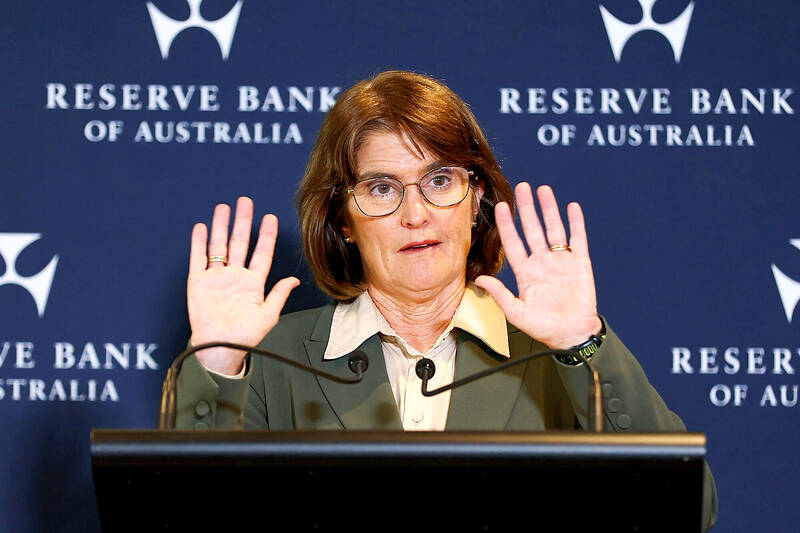Australia’s central bank yesterday reduced its benchmark interest rate for the first time since October 2020 as the nation’s inflation cools.
The Reserve Bank of Australia (RBA) reduced the cash rate by a quarter percentage point from 4.35 percent to 4.1 percent at its first board meeting of the year. The central bank had held the cash rate at 4.35 percent since November 2023.
The cut was widely anticipated after inflation rose only 0.2 percent in the December quarter last year and 2.4 percent for the calendar year. Annual inflation peaked at 7.8 percent two years earlier.

Photo: Bloomberg
“Inflation has fallen substantially since the peak in 2022, as higher interest rates have been working to bring aggregate demand and supply closer towards balance,” the central bank’s board said in a statement.
RBA Governor Michele Bullock later advised against believing economic forecasts that several more rate cuts were expected this year. The board would next consider changing interest rates at its meeting on April 1.
“Some other central banks have cut interest rates quite sharply over the past year, but we have taken a different strategy to most,” Bullock told reporters.
“Our policy rate was not raised as much as many countries overseas. We judged that while inflation expectations remained anchored, we could take a bit longer to bring inflation back to the target band, but we could keep unemployment lower,” she added.
Unemployment in Australia remained at near-record low levels of 4 percent in December last year, up from 3.9 percent the previous year.
Bullock said that US plans to increase tariffs on trading partners had the potential to be bad for economic activity around the world.
“The tariff threats and what’s going on overseas is very uncertain and probably even worse, it’s unpredictable,” Bullock said.
The rate shift is a welcome development for Australian Prime Minister Anthony Albanese’s center-left Labor Party government which will seek reelection at elections due by May 17.
Australian Treasurer Jim Chalmers welcomed the independent board’s decision.
“This is the rate relief Australians need and deserve,” Chalmers said in a statement. “It won’t solve every problem in our economy or in household budgets but it will help.”
The high cost of living and a shortage of housing around Australia are expected to be major issues in the upcoming election campaign.

CHIP RACE: Three years of overbroad export controls drove foreign competitors to pursue their own AI chips, and ‘cost US taxpayers billions of dollars,’ Nvidia said China has figured out the US strategy for allowing it to buy Nvidia Corp’s H200s and is rejecting the artificial intelligence (AI) chip in favor of domestically developed semiconductors, White House AI adviser David Sacks said, citing news reports. US President Donald Trump on Monday said that he would allow shipments of Nvidia’s H200 chips to China, part of an administration effort backed by Sacks to challenge Chinese tech champions such as Huawei Technologies Co (華為) by bringing US competition to their home market. On Friday, Sacks signaled that he was uncertain about whether that approach would work. “They’re rejecting our chips,” Sacks

NATIONAL SECURITY: Intel’s testing of ACM tools despite US government control ‘highlights egregious gaps in US technology protection policies,’ a former official said Chipmaker Intel Corp has tested chipmaking tools this year from a toolmaker with deep roots in China and two overseas units that were targeted by US sanctions, according to two sources with direct knowledge of the matter. Intel, which fended off calls for its CEO’s resignation from US President Donald Trump in August over his alleged ties to China, got the tools from ACM Research Inc, a Fremont, California-based producer of chipmaking equipment. Two of ACM’s units, based in Shanghai and South Korea, were among a number of firms barred last year from receiving US technology over claims they have

It is challenging to build infrastructure in much of Europe. Constrained budgets and polarized politics tend to undermine long-term projects, forcing officials to react to emergencies rather than plan for the future. Not in Austria. Today, the country is to officially open its Koralmbahn tunnel, the 5.9 billion euro (US$6.9 billion) centerpiece of a groundbreaking new railway that will eventually run from Poland’s Baltic coast to the Adriatic Sea, transforming travel within Austria and positioning the Alpine nation at the forefront of logistics in Europe. “It is Austria’s biggest socio-economic experiment in over a century,” said Eric Kirschner, an economist at Graz-based Joanneum

BUBBLE? Only a handful of companies are seeing rapid revenue growth and higher valuations, and it is not enough to call the AI trend a transformation, an analyst said Artificial intelligence (AI) is entering a more challenging phase next year as companies move beyond experimentation and begin demanding clear financial returns from a technology that has delivered big gains to only a small group of early adopters, PricewaterhouseCoopers (PwC) Taiwan said yesterday. Most organizations have been able to justify AI investments through cost recovery or modest efficiency gains, but few have achieved meaningful revenue growth or long-term competitive advantage, the consultancy said in its 2026 AI Business Predictions report. This growing performance gap is forcing executives to reconsider how AI is deployed across their organizations, it said. “Many companies